 |
  |
 |
published: April 12, "1994"
Jimi Hendrix :Blues CD Booklet by Michael Fairchild |

What's New & Previews
Jimi's Prediction —
A Remote View About Jimi Hendrix Timeline Blog Asteroid Impact Evolution Woodstock Blues Jimi Code VS. Da Vinci Code Credit Thefts Missile Agency/Moon Base Charade Remote View Mutation Seattleland Censorship Events Skewed Science Search Engine Rankings Download An Ad AT&T: New Nuremberg Wall(y)flower Syndrome Rochester Media DVD/CD Store More Links...
Page 4 of 10
Jimi & Wilson Pickett 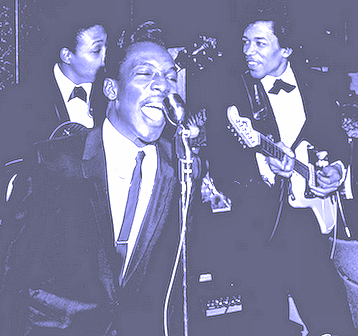
Albert King remembered Hendrix was still a teen when they met. Jimi was sitting in with an East St. Louis band and being laughed at by leader Ike Turner. Albert, who was left handed too, defended the southpaw kid. He took Jimi aside and they traded notes. "I like Albert King," Jimi said. "He plays completely and strictly in one way, just straight funk blues, new blues guitar, very young, funky sound, which is great. One of the funkiest I've heard. He plays it strictly that way, so that's his scene."
Hendrix sightings from this time on report a transformed player. In 1961 Billy Cox was amazed by Jimi's combination of "Beethoven and John Lee Hooker". Billy picked up a bass and began jamming. "Just about everything Jimi and I recorded was blues," he told Guitar Player.
Jimi with Billy on bass 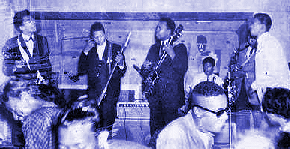 "Everything was right from the soil, right from the depth of mankind. Even the current stuff Jimi played was just amplified blues. Jimi's playing was always rooted in the blues, those were the only songs that we jammed on at the very beginning, because musically we were limited. At that time he was basically a rhythm 'n' blues player. That was his roots. His favorite players were Muddy Waters, Howlin' Wolf, Lightnin' Hopkins, Albert King, B.B. King, and especially Slim Harpo. Those blues masters were Jimi's early influences, and a lot of songs that we initially started playing were by those guys. He was also aware of Robert Johnson and Leadbelly, and 'Elmo' James, as he spoke of him. Jimi liked Jimmy Reed also, but we got more into a lot of B.B. and Albert King. When Jimi and I stayed in Nashville together after the Army, all I had was blues records. We'd pull out a record by Albert King or B.B. King and maybe learn a lick or two, because at that time people liked to hear stuff that was current; Bobby Blue Bland, Albert King and B.B. King were very fashionable and popular. In fact, I used to keep all these cassettes of blues with me, and we'd play them, so we were constantly covered with the masters. Jimi would get so excited when he heard a great Albert King lick - oh, wow! I always remember those facial expressions he would get. He told me he played with Slim Harpo for a couple of dates. And we backed several other artists together - Nappy Brown, School Boy, Carla Thomas, and Ironing Board Sam."
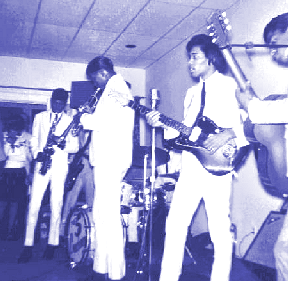 Little Richard Band with Jimi Jimi made a pilgrimage to Chicago's Chess Records and jammed with Muddy Waters, but Waters didn't need another guitar. Hendrix went back on the road. "I don't like to get hung up on any one guitarist, because I always feel kinda unfaithful when I move on to someone else." In a 1964 postcard to Al he wrote, "We're playing all through the South, we'll end up in Dallas. My home address is in Atlanta." Two years later another postcard instructed Al to "Tell Ben and Ernie I play the blues like they NEVER heard.
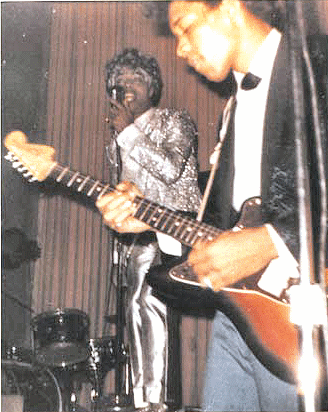 By this time Jimi had performed with a who's who of American rhythm and blues. "I met him with Little Richard," B.B. King told a journalist, "and he was kind of quiet, shy, he didn't open up too much. I did several shows with Jimi, that's when I got to know him better. We had small discussions on things, and he was very polite, a very nice guy. We didn't just play in the South. We played the east coast on some of the big shows. I know we did the Carolinas, up to Washington, up to Philadelphia. He was great at that time, he was extraordinary then. The audience liked him, I liked him, and not only was he liked by the audience, but he was well liked behind stage." Of the tour circuit, Jimi said, "I dig the South a little more than playing in the North. Texas and Florida. I don't know why. Maybe it's the weather, and the feeling of it. Down South is great. New Orleans? That's great. Most of the cats born in the south move north. They end up in Chicago because that's a sort of middle city and the competition isn't as fierce there. Most of the guitarists come from the South. In Atlanta and Louisiana there are some great guys. There's Albert King and Albert Collins, they're some of the best guitarists in the world."
Jimi & Isley Brothers 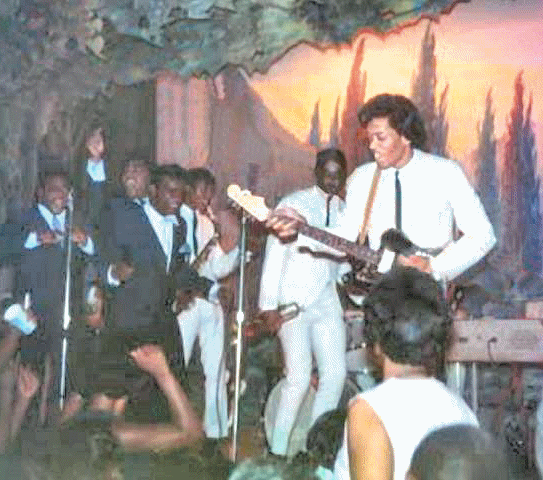 Albert Collins remembered, "Little Richard is the one who introduced me to Jimi. He played R&B when he was with Little Richard. I replaced him in that band when he went to join a band called the Drifters, I played the rest of the tour. I'm from Texas, I didn't travel much, and Richard brought him down to see my band play, I was in this little club called the Club 500 in Houston, the Third Ward - that's where I was raised up. So Little Richard say, 'Weee-oooh, I got a guy with me, I want you to hear him play, he can play so gooood'. So I said, 'bring him around tomorrow night.' Now I had four horns and a rhythm at the time, and I thought I was just cooking. Then Little Richard come up and introduce us, and Jimi asked, 'Can I sit in?' 'Sure, okay, go get your guitar.' Man, he come rolling out to the end of the stage, and one of Little Richard's roadies say, 'Man, you don't get him off of there, he's gonna end up on the tables!' (laughs) Oh, he was rough. Oooh, man, he was powerful even then, he could play some blues. We became friends and hung out together." Jimi singled out Thaw Out and Kool Aid by Collins and transformed them into his version of Drivin' South. "There's one cat I'm still trying to get across to people," Jimi said, "his name is Albert Collins. He's buried in a roadband somewhere. He's good, really good, a very smooth guitarist."
.
|
| © 1994 First Century Press. All Rights Reserved. Contact Us |
